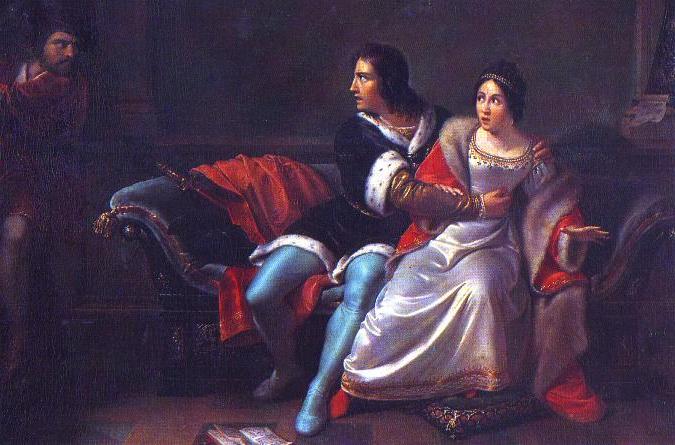This article was originally published on ReligionToday.com. It is cross-posted with permission.
Francesca de Polenta’s family in Ravenna, Italy had been at war with the Malatesta family of Rimini for years. Finally there was peace. The price, however, included Francesca’s marriage to Giovanni Malatesta in about 1275. It appears to have been a loveless marriage to a man who was, according to scholar Anthony Esolen, “crippled in body and soul.”
Francesca soon fell in love with Giovanni’s brother, Paolo, and they carried on an affair until Giovanni murdered them as they lay together. The poet Dante in his Inferno puts them in the Second Circle of Hell, the place of adulterers.
Francesca and Paolo are physically united forever, yet without love since there is no love in Hell. With all the other adulterers, they are blown through the air by one gust after another:
And as a flock of starlings winter-beaten
founder upon their wings in widening turns
so did that whirlwind whip those evil souls,
Flinging them here and there and up and down;
nor were they ever comforted by hope—
no hope for rest, or even lesser pain. (Canto 5, lines 40-45)
Anthony Esolen, whose translation of the Divine Comedy I’m reading, notes that Dante did not use some profligate, “all-lecherous” character as an example of adultery. Instead “our paradigmatic sinner is the courtly and lovely Francesca, and her sin has every worldly justification you can name.”
Hers, we might argue from our 21st century perspective, was no marriage. She was just being used—yea, even abused. Didn’t she have the right to be happy with someone who loved her? And after all, as she tells Dante:
Love, which allows no loved on not to love
seized me with such a strong desire in him
that, as you can see, it will not leave me yet. (Canto 5, lines 103-105)
Or, as Woody Allen told Time Magazine in justifying has affair with former-girlfriend Mia Farrow’s adopted young daughter, “The heart wants what it wants. There’s no logic to those things. You meet someone and you fall in love and that’s that.”
Most of us today seem to be okay with that. Yet how much misery has been brought into the world through fornication, adultery, divorce, remarriage, and who knows what else—even among Christians—justified by nothing more than, “My heart wants what it wants”? And if the heart wants it, who can or should say, no?
Yet that mindset—more even than the adultery—is the reason Francesca and Paolo are damned.
In this life, they were controlled by their desires: the heart wants what it wants. They ignored the role reason has in instructing the will to choose the good in spite of feelings and desires. In the process, they made reason the slave of desire in order to rationalize their willfulness—a habit Francesca maintains even in Hell.
Esolen explains, “Those who subjected reason to the storm of passion now suffer that storm whether they will or not. [Thomas] Aquinas says that reason must direct the will by informing it of the good or evil of a choice. The sin of lust—like the other sins against temperance (gluttony, avarice, wrath, and sloth…)—reverses the order.”
Our culture has made a virtue of the vice. The phrase “If it feels good do it,” may be a relic of the seventies, but the sentiment is still with us and it’s on steroids. Our feelings and desires, we believe, cannot and should not be resisted.
This thinking, however, puts us at odds with the Scriptures and with a Christian understanding of what it means to be human.
Consider these strange commandments (and make no mistake, they are commandments): “Be joyful always” (1Thessalonians 5:16) and “Be anxious about nothing,” (Philippians 4:6). Disobedience (joylessness or anxiety) is sin.
That is utterly meaningless to those who allow their feelings—joy or sadness, anxiety or peace—to dictate their choices and run their lives. But if God intends reason to rule our lives including our emotions, these commands make perfect sense. In light of Christ’s incarnation, death, resurrection, ascension, and second coming, reason informs us that choosing joy and peace makes all the sense in the world. Then we put a smile on our faces, and, with practice, our feelings and desires follow along.
The commandments to avoid fornication, adultery, and the catch-all “sexual impurity” (porneia in Greek), follow the same pattern. So does faithfulness to our marriage vows. The heart may want what it wants, but, because we are human, reason, not the heart’s fleeting (windblown?) desires should always have the final say.
Thinking and acting this way will put Christians at odds with the prevailing culture. And that, of course, is just where we belong.
Jim Tonkowich is past president of the Institute on Religion & Democracy. His new book The Liberty Threat: The Attack on Religious Freedom in America Today is available for Kindle and hard copy from St. Benedict Press.





Comment by Namyriah on December 29, 2014 at 5:48 pm
“The heart wants what it wants.” Why not be more precise, Woody, and say “MY heart wants what it wants, and MY heart overrules everyone else’s.” Read Mia Farrow’s autobiography, she provides gruesome details about the pedophile Woody Allen and what his “heart” wanted.
Hitler’s heart wanted a world free of Jews and other “life unworthy of life.” Had he lived a few years longer, he might have come closer to his heart’s desire, and Woody Allen wouldn’t even exist.